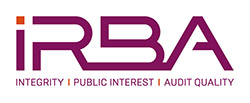IRBA expresses disappointment at soft sanction against Deloitte auditor
|
Johannesburg, Friday, December 11, 2020 – The Independent Regulatory Board for Auditors (IRBA) has expressed its disappointment on the soft sanction ruling by the Disciplinary Committee in the matter of IRBA vs Jordan, and has emphasised that this merely underscores the need to pursue the Auditing Profession Act Amendments (APAA) with haste in order to ensure that public interests and those of investors are adequately protected through the imposition of appropriate sanctions and fines which will act as a suitable deterrent to Registered Auditors. The IRBA strongly believes that monetary sanctions imposed by the committee on errant auditors should be commensurate with the losses experienced by investors due to improper conduct. Unfortunately, the current legislative framework limits the imposition of fines to a maximum of R200 000, per charge, which could easily be viewed as lenient where the committee has found that no reasonable grounds exist for the removal of the registered auditor’s name from the register. The IRBA has been calling for the amendments for the last two years, citing its frustration with low fines which are often at odds with the nature of improper conduct before the committee and/or not effective as a deterrent to improper conduct. The IRBA has called for harsher sanction, and National Treasury and the Parliamentary Standing Committee on Finance heeded the call, when they approved amendments to the APA to empower the ministered to prescribe appropriate sanctions for improper conduct. The IRBA believes that this process will ensure that harsher fines, commensurate with audit failures often presented before the committee are introduced, thus ensuring the protection of the public through deterrence and retribution. The APAA was debated in the National Assembly on December 2 and the bill was unanimously adopted by all parties. It has since been sent to the National Council of Provinces for concurrence. It is expected to return to the National Assembly early in the new year, if there are further proposed amendments, alternatively, it will be tabled before the president for assent. The IRBA hopes that the Bill will be signed into legislation by President Cyril Ramaphosa sometime during the first quarter of 2021. The IRBA confirmed that the determination of sanction is in the hands of the independent disciplinary committee and are not determined by IRBA. IRBA had, during its submissions in aggravation of the sanction during the hearing held on November 21 to 23, called for the disciplinary committee to order the deregistration of Mr Jordan – this, being the most severe sanction which the committee could hand down. Notwithstanding the above, the Committee did not agree with the IRBA’s submission that the offences of which the respondent was convicted were sufficiently serious to warrant deregistration, more so, in the absence of a finding of guilty on dishonesty. Nor was the Committee satisfied that a lengthy suspension from practice for a period of three years would be appropriate. In addition to the above, the Disciplinary Committee endorsed the agreement between the parties that the respondent pay a contribution to the costs of the proceedings in an amount of R 31 176 618.30. The IRBA is of the view that errant auditors should be brought to book in a manner that is commensurate to the offence committed. This particular instance represents a failure of a capital market audit and the economic and social ramifications must be understood. Consequently, auditors need to demonstrate an enhanced responsibility for accuracy and diligence in their conduct as auditors of financial institutions. Furthermore, a number of South Africans lost their lifetime savings through the investments made in African Bank and it is vital that the IRBA protects the public in dealing with errant auditors and restores the trust and confidence in the auditing profession. The IRBA’s commitment to bring errant auditors to book is clearly indicated by the resources expended on this particular hearing, which took place over 67 days and cost the IRBA in excess of R60m. Further to the above, it is important to note that the Disciplinary Committee, having found that Deloitte had shared culpability with regards to certain aspects of the audit, called on Deloitte, whilst not charged for any offence, to make a donation to two historically disadvantaged universities in furtherance of the restoration of the reputation of the auditing profession. The IRBA welcomes this part of the sanction.
More about the IRBA: The IRBA is a public protection statutory body established to protect the financial interests of the public by ensuring registered auditors and their firms deliver services of the highest quality. It upholds audit firm independence to ensure that audit quality is such that it enhances the accuracy and credibility of financial performance reporting. In this way, the IRBA has an important role to play in building the reputation of South Africa as an investment market for both local and global investors and driving economic growth for the country. The IRBA also registers suitably qualified accountants as auditors, who must adhere to the highest ethics standards, and promotes the auditing profession through the effective regulation of assurance conducted in accordance with internationally recognised standards and processes.
|





